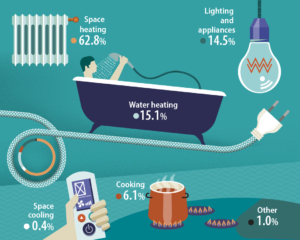Investigating the determinants of household energy consumption
The present study draws motivation from the United Nations Sustainable Development Goals and explores the nexus between access to modern cooking energy sources, responsible energy consumption, climate change mitigation, and economic growth. Using 2018 demographic and health survey data, the study examines the influence of key socioeconomic and demographic factors on household choice of cooking energy in Nigeria.
The empirical results show that traditional energy sources are dominant among Nigerian households (74.24%) compared to modern energy sources (25.76%). Regarding energy demographics, male-headed households show more usage of modern energy sources (19.86%) compared to female-headed households (5.90%). Regional analysis reveals that the northwest region predominantly uses traditional energy sources (18.60% of the share of total traditional energy sources), while the southwest region shows the greatest usage of modern energy sources (10.52% of the share of total modern energy sources).
Binary logistic regression analysis reveals the positive and statistically significant influence of wealth index, education, and geopolitical region on the likelihood of utilizing modern energy sources. Conversely, household size and place of residence indicate an inverse relationship with the likelihood of adopting modern energy sources.
These findings have important policy implications for energy efficiency, environmental sustainability, and improving the quality of life in Nigeria, which is currently plagued with significant energy poverty, especially in rural communities.
Highlights:
• Examination of household energy utilization in Nigeria.
• We found that traditional energy utilization is accounted for by 74.24% of households.
• Clean energy source accounts for 25.76% of the households.
• 19.86% and 60.86% of male-headed households utilize clean and traditional energy, respectively.
• 5.90% and 13.38% of female-headed households utilize clean and traditional energy, respectively.
• 18.60% and 7.14% of Northwestern region and Southwest region have the highest traditional and cleaner energy sources, respectively.
In the twenty-first century, energy consumption has become increasingly more critical than ever before due to growing concerns about climate change, environmental sustainability, and energy intensity resulting from human activities. The residential, transportation, industrial, and commercial sectors are the major end-use sectors for energy consumption, according to documentation from the United States Energy Information Administration. Residential energy usage, including cooking, air conditioning, and powering electric appliances, significantly contributes to energy consumption and greenhouse gas emissions. Therefore, understanding household energy consumption is vital for assessing energy intensity and its impacts on people, the economy, and the environment.
Geographical location and climate increasingly shape the dimensions of household energy demand. In developed countries, energy consumption in the residential and transportation sectors accounts for at least 40% of total country-level energy use. For instance, in the United States, household energy use for space heating and air conditioning accounted for more than 51% of total annual household energy consumption in 2015.
In the European Union (EU), household energy uses accounted for 26% of total energy consumption in 2019, with space heating (63.3%), lighting and appliances (14.1%), water heating (14.8%), cooking (6.1%), and space cooling (0.4%) being the primary end uses [5]. To encourage more sustainable consumption patterns and reduce environmental pollution, there is an increasing focus on promoting energy efficiency in developed countries.

In contrast, household energy needs in regions like sub-Saharan Africa, including Nigeria, are significantly determined by factors such as physical home characteristics, the nature of energy devices, place of residence, and household size. Culture and living standards also play a significant role in household energy usage across developing economies. Other studies have highlighted the influence of access and type of energy sources, education, and income or wealth status [14, 15] on household energy consumption. The complexity of promoting widespread access to sustainable energy services in developing countries is evident from the various factors that shape household energy consumption.
The United Nations Sustainable Development Goals (SDG) energy goal (SDG-7) 7.1 emphasizes ensuring “universal access to affordable, reliable, and modern energy services” by 2030. However, attaining this goal requires addressing inequalities among regions and populations rather than focusing solely on the proportions of populations or households with access to modern energy sources at the national level.
Also Read:https://www.sciencedirect.com/topics/engineering/domestic-energy-consumption
